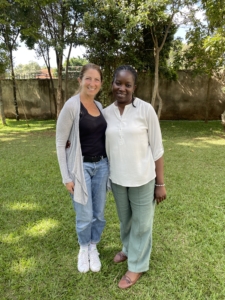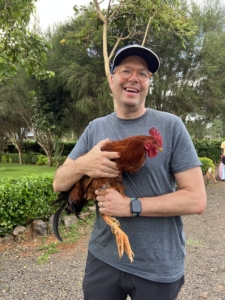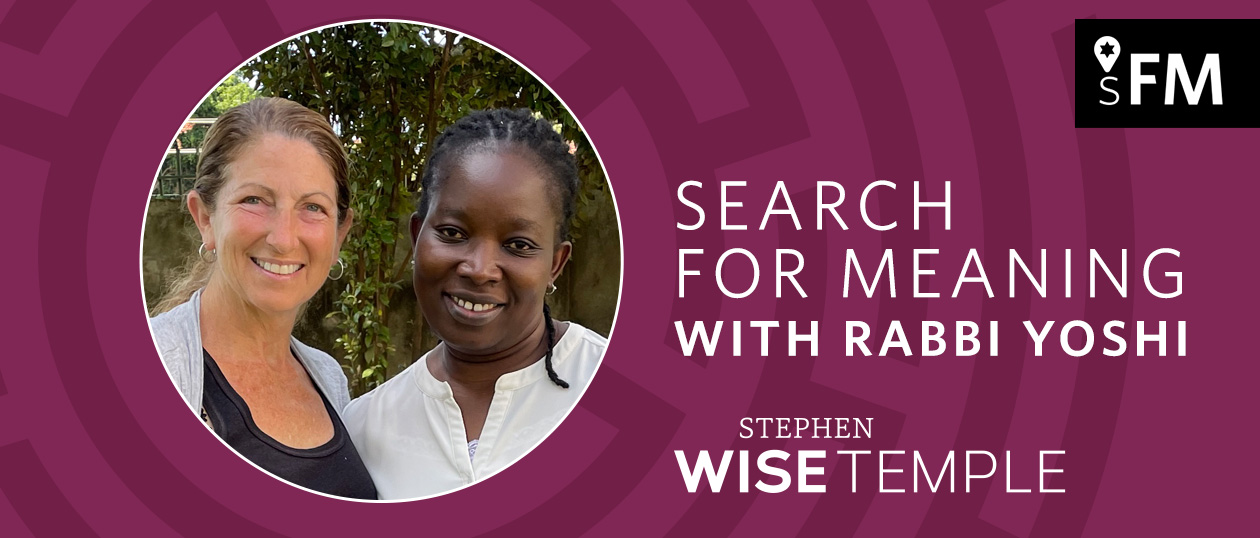In this edition of his Search for Meaning podcast, Stephen Wise Temple Senior Rabbi Yoshi Zweiback hosts Carol Mabeya, gynecologist Dr. Debbie Matityahu, and Ariela Zweiback of Beyond Fistula.

Dr. Debbie Matityahu and Carolyn Mabeya of Beyond Fistula. (Photo by Rabbi Yoshi Zweiback)
During his sabbatical, Rabbi Yoshi spent two weeks in Eldoret, Kenya working with Beyond Fistula, a non-profit charity that aids women and girls in Africa who have recently undergone surgical repair for fistulas, helping them rebuild their lives through education and vocational skills training. It was a transformative experience for Rabbi Yoshi and his family, including Ariela.
Beyond Fistula got its start during Dr. Matityahu’s 10-month family trip around the world with her husband and two children in 2010. The Matityahus spent one of those months in Kenya, where they met and worked with Carol’s husband, Dr. Hillary Mabeya, the founder and primary surgeon at Gynocare Women’s and Fistula Hospital. At that hospital, Dr. Matityahu and her 12-year-old daughter Arielle found a cause.
Obstetric fistulas are holes that occur when a woman undergoes a long and obstructed labor during childbirth. Though largely eradicated in the developed world, obstetric fistulas are still a devastating scourge for women in the world’s poorest countries.
Women laboring in huts in remote villages may push for days—rather than hours—on end with no anesthesia or medical support. The baby’s head pinches and necroses the tissue between the vagina and the bladder, and sometimes the vagina and the rectum, destroying that tissue. The tissue erodes off, creating the fistula, which can lead to uncontrolled leakage of urine and feces. Many of the babies do not survive, and the women are left exhausted, incontinent, humiliated, and—all too often—ostracized by their community.
“I remember one of the young girls that we operated on had such severe internal damage, that I, as a gynecologist who looks at this anatomy almost every day, could not identify what was left inside the pelvis,” Dr. Matityahu said. “Everything had necrosed off. No bladder, no vagina, the colon was hanging open … It was so devastating that I had no idea what I would have done next.”
Dr. Matityahu wanted to learn more about that women, and those like her. As she listened to their horrific stories of rape, starvation humiliation, and desperation, she felt like she had to do something. Three of the women she operated on had one desire after surgery: They wanted to go back to school.

During his sabbatical in Kenya, Rabbi Yoshi holds a rooster gifted to him and his family by one of the beneficiaries of Beyond Fistula’s work. (Photo Courtesy of Rabbi Yoshi Zweiback.
What started with Dr. Matityahu donating money to fund those three women’s education grew into an organization that picks up where surgery leaves off. Not only does Beyond Fistula fight the trauma and stigma facing women who suffer from fistulas, but it provides hope and dignity, along with education, room and board, and vocational training on its property in Kenya. Originally set up with one house and a tailoring program for six young women, Beyond Fistula has evolved. They now offer counseling and courses in tailoring, hairdressing, literacy skills, computer skills, and business for women of all ages—from those in their teens and those who have lived with the fallout from fistulas for 50 years. Through partner Farming God’s Way, Beyond Fistula even offers a farm skills training program, whose graduates not only leave with training, but a grant to start their own small farming business.
During Rabbi Yoshi’s two weeks working with Beyond Fistula, he heard the story of one young woman who developed a fistula and suffered severe back injuries as a result of rape when she was just 14. Because she was brave enough to testify against the men who raped her, she was forced to leave her home and relocate with her family for safety. Gynocare helped repair her physical injuries, and Beyond Fistula helped her to learn a profession, feel supported, and find community. In gratitude to the Beyond Fistula team, the young woman’s family gifted Rabbi Yoshi a rooster raised on Beyond Fistula’s farm.

